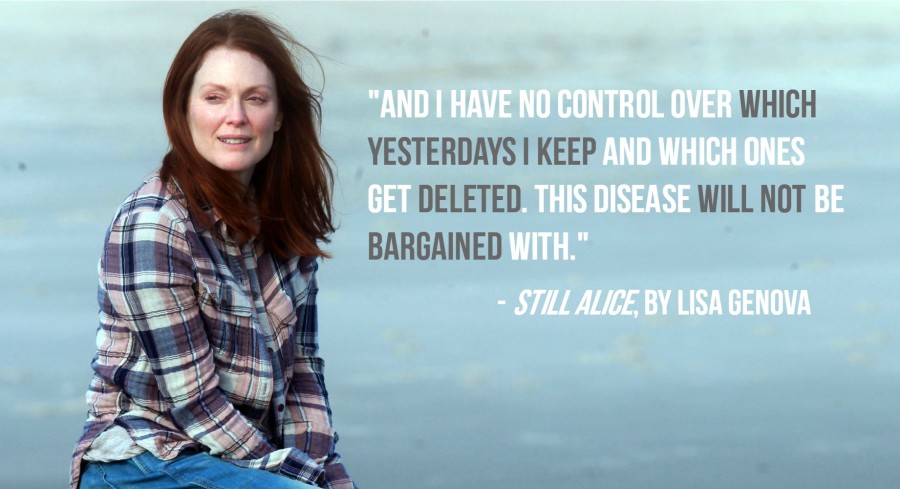Still Alice: No matter what her state is.

Whenever someone asked me: "What do you think the future's gonna be like?" I didn't reply them with predictions on how advanced our technology in the future would be. I didn't reply them with predictions the consists of flying cars or genetically enhanced supers-soldiers. I just reply them: old age, and the disease that follows it, including a chance of me getting Alzheimer's disease, and then the inevitable goal of all life: death.
Still Alice (2014) is a drama film based on a bestselling novel of the same name written by Lisa Genova, which depicts the story of a linguistics professor named Alice and her tragedy caused by early onset Alzheimer's. The film itself was an even bigger tearjerker than the world renowned classic Titanic (1997), for the cause of Alice's misfortune can happen to anyone, including you yourself or your loved ones. Imagine seeing your parents slowly aging, and their minds slowly deteriorating due to the disease, and there's nothing you can do about it except wait for the inevitable and taking care of them for as long as they live.

Alzheimer's disease is the most common form of dementia, which is primarily characterized by symptoms such as difficulties remembering or retaining information (Guzmán-Vélez et al., 2014) and deteriorating cognitive function. This progressive disease, caused by the slow buildup of plaques (beta-amyloid protein deposits) and tangles (tau protein deposits) in between nerves cells in the brain, has yet to find an effective cure.
The type of Alzheimer's Alice suffered in the film is the early-onset Alzheimer's disease, which has been found by Chartier-Harlin et al. (1991) to be caused by a genetic mutation of the β-amyloid precursor protein gene. Not only it caused Alice to develop the disease at the very early age of fifty, it was also found to be hereditary, which made their tragedy even more heartbreaking as their eldest daughter was later tested positive for the disease.

As the film progresses, so does Alice's condition. The film portrayed her emotional reaction towards her disease (which is true to the actual emotional responses of people suffering with dementia towards their own condition) with detail, beginning with her shock of discovering her disease, followed by anger at her husband's constant denial of the subject and grief when she break the news to her children. Her loss of self-esteem as her memory capacity lessens over the course of the film quickly became fear, and later desperation and despair as she made memory exercises for herself in an attempt to delay the inevitable and left an instruction video for herself to commit suicide should she was unable to complete any of the memory tasks she set for herself, as she would rather die instead of becoming a burden to her beloved family.
The family's psychological changes (which reflects the emotional responses of family members of real life Alzheimer's patients) were also shown in the film, starting with Alice's husband's initial denial of her condition and her children's shock to the news, followed by the stress and burnout that progressively appears throughout the course of the movie. In the end, Alice's husband, who cannot cope with the burnout caused by him constantly taking care of Alice in her condition and the despair of seeing his own wife's slow and inevitable mental deterioration, left her to their youngest daughter. His anxiety from the beginning of the film regarding Alice condition could also be a foreshadowing of his burnout at the end of the film, as one's anxiety levels had been suggested to be a significant predictor to one's burnout (Yilmaz et al., 2009).
While being a massive tearjerker, the film to my surprise gave a bittersweet ending by exploiting on one of the characteristics of Alzheimer's: the retention of emotional connections and experiences. It has been found by Guzmán-Vélez et al. (2014) that while declarative memory in Alzheimer's patients had been impaired, emotional experiences can still remain in their memory. The ending of the film shows Alice's youngest daughter Lydia reading her an excerpt of the play Angels in America, and asked her what she thinks this excerpt is about. Alice responds, albeit with difficulty, the word "love", to which Lydia responds with affirmation.
Should they inevitably be someone you love: please treat them with more love, respect and care; as they are still human, and they are still the one that had loved you, no matter what state they're in.
Thank you for reading.

References:
Chartier-Harlin, M. C., Crawford, F., Houlden, H., Warren, A., Hughes, D., Fidani, L., Goate, A., Rossor, M., Roques, P., Hardy, J. & Mullan, M. (1991). Early-onset Alzheimer's disease caused by mutations at codon 717 of the β-amyloid precursor protein gene. Nature, volume 353, pages 844–846. doi:10.1038/353844a0
Guzmán-Vélez, E., Feinstein, J. S. & Tranel, D. (2014). Feelings Without Memory in Alzheimer Disease. Cogn Behav Neurol, 27(3): 117–129. doi: 10.1097/WNN.0000000000000020
Yılmaz A., Turan E. & Gundogar D. (2009). Predictors of burnout in the family caregivers of Alzheimer's disease: Evidence from Turkey. Australasian Journal of Ageing. doi: https://doi.org/10.1111/j.1741-6612.2008.00319.x
Comments
Post a Comment